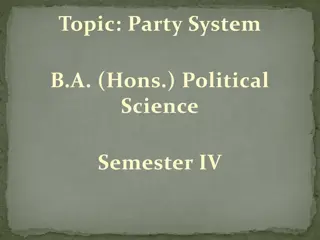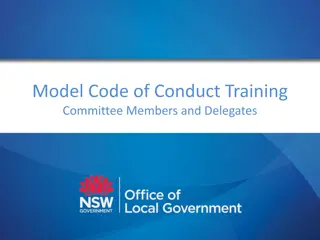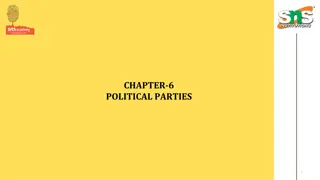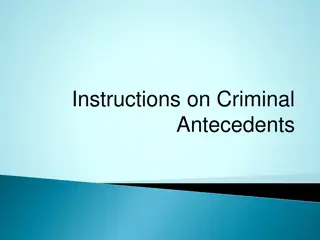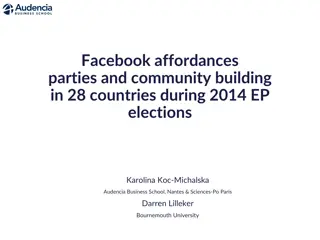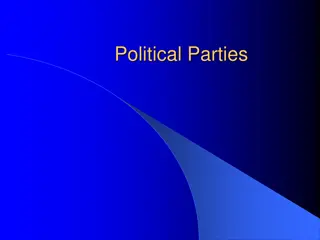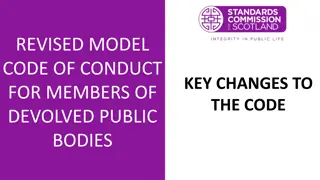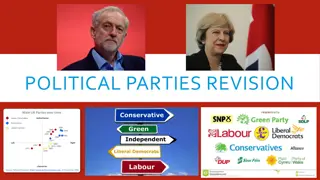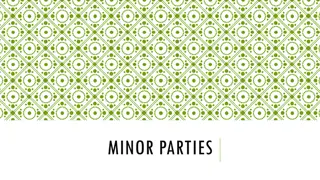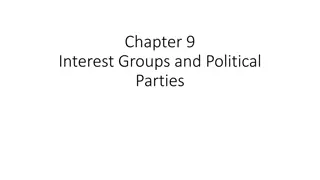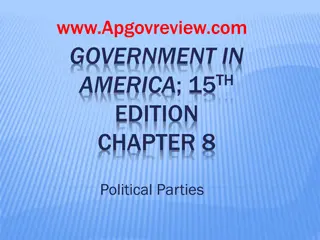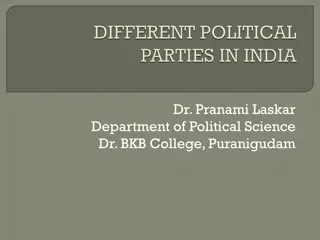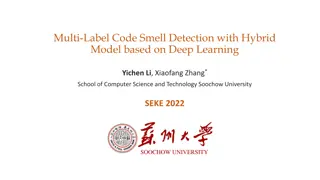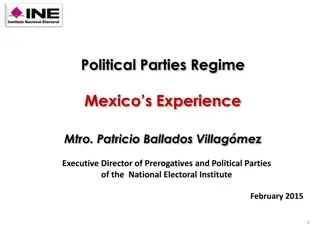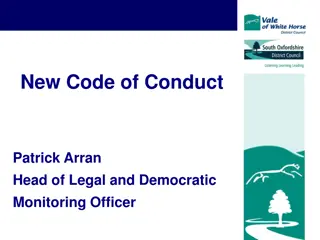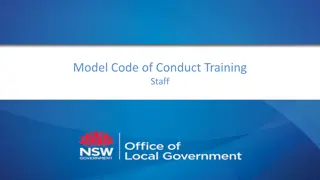Understanding the Model Code of Conduct for Political Parties and Candidates
Model Code of Conduct (MCC) is a set of norms developed in consensus by political parties and enforced by the Election Commission to ensure fair elections. It establishes guidelines for general conduct, meetings, processions, polling day, observers, parties in power, and election manifestos. The MCC aims to provide a level playing field for all parties and candidates during elections, prohibiting activities like using caste and communal feelings for votes, criticism based on unverified reports, voter intimidation, and more.
Download Presentation

Please find below an Image/Link to download the presentation.
The content on the website is provided AS IS for your information and personal use only. It may not be sold, licensed, or shared on other websites without obtaining consent from the author. Download presentation by click this link. If you encounter any issues during the download, it is possible that the publisher has removed the file from their server.
E N D
Presentation Transcript
Model Code of Conduct Model Code of Conduct (for the guidance of political parties & candidates) By Narendra Narendra N. Sr. Principal Secretary Sr. Principal Secretary N. Butolia Butolia
What is Model Code of Conduct What is Model Code of Conduct Model Code of Conduct (MCC) for political parties and candidates is a set of norms evolved with the consensus of political parties and enforced by the Election Commission. The provisions of this Code have been, by and large, adhered to by political parties and it helps the Election Commission to conduct free and fair elections. The main objective of the Code is to to provide provide a a level all all parties parties and and contesting contesting candidates candidates during the elections. level playing playing field field for for
Key provisions of the Model Code of Conduct Key provisions of the Model Code of Conduct The MCC contains eight provisions which are as follows - General Conduct General Conduct: : Criticism of political parties must be limited to their policies and programmes, past record and work. Activities such as: Using caste and communal feelings to secure votes, Criticising candidates on the basis of unverified reports, Bribing or intimidation of voters, and Organising demonstrations or picketing outside houses of persons to protest against their opinions, are prohibited.
Meetings Meetings: : Parties must inform the local police authorities of the venue and time of any meeting in time to enable the police to make adequate security arrangements. Processions Processions: : If two or more candidates plan processions along the same route, organisers must establish contact in advance to ensure that the processions do not clash. Carrying and burning effigies representing members of other political parties is not allowed. Polling Polling day day: : All authorised party workers at polling booths should be given identity badges. These should not contain the party name, symbol or name of the candidate.
Observers Observers: : The Election Commission will appoint observers to whom any candidates may report problems regarding the conduct of the election. Party Party in in power power: : The MCC incorporated certain restrictions in 1979, regulating the conduct of the party in power. Ministers combine combine official official visits visits with with election election work the the same same. . The party must avoid avoid advertising advertising at at the exchequer exchequer or using official mass media for publicity on achievements to improve chances of victory in the elections. Ministers and other authorities must must not not announce announce any any financial construction construction of of roads, roads, provision provision of of drinking must must be be allowed allowed to to use use public public spaces spaces and not not be be monopolised monopolisedby by the theparty party in in power Election Election manifestos manifestos: : Added in 2013, these guidelines prohibit parties from making promises that exert an undue influence on voters, and suggest that manifestos also indicate indicatethe Ministers must use official official machinery the cost cost of of the must not machinery for the public not for work or or use public financial grants, drinking water, and rest rest houses power. . grants, or or promise water, etc etc. . Other houses and and these promise any Other parties parties these must any must themeans means to to achieve achievepromises promises. .
Evolution of MCC Evolution of MCC For the first time Model Code of Conduct was adopted for Assembly Election of Kerala way back in 1960. In 1962, on the eve of third General Election, the Election Commission circulated that code amongst all recognised political parties and to State Governments with an advisory to discuss the code with political parties in their States for giving their consent and acceptance to it. Political parties generally accepted and followed the provisions of code in that General Election. In 1991, the code was consolidated by the Election Commission and from that time the Commission has been ensuring its strict compliance in letter and spirit for conduct of peaceful, free and fair election.
An agreement was reached on 16thApril, 2001 between the Election Commission and the Union Government that Model come come into into force force from from the the date date the the Election the the schedule schedulefor for election election. . Though a rider was added that such announcement shall not ordinarily be made more than 3 weeks in advance of the date of notification of that election. It was also agreed that the inauguration of any completed projects or laying of foundation stones of new projects may servants servants instead instead of of political political functionaries functionaries. . Accordingly, Part VII was suitably modified to expressly make provision to both the above effects. Model Code Commission announces Code would announces would Election Commission may be be done done by by civil civil
Until 2013 MCC had seven paragraphs which include general conduct for parties and candidates and also parties in power. In 2013, the Supreme Court in its judgment dated 5thJuly, 2013 in SLP(C) No. 21455 of 2008 (S. Subramaniam Balaji Vs Govt. of Tamil Nadu and Others) directed the Election Commission to include guidelines regarding election manifestos in MCC. Consequently, ECI framed guidelines on Election Manifesto after having consultation with political parties and included it in the MCC as eighth para in 2014.
Rationale behind MCC Rationale behind MCC MCC aims to provide provide level contesting candidates and comes into operation from the day ECI announces the program for election in your constituency and will be in force till the completion of the election Developed for maintaining maintaining a a healthy healthy and conducive to the conduct of smooth elections. A visible and rigorous enforcement of Model Code of Conduct enhances enhances the the credibility credibility of of the the elections elections and gives confidence to the stakeholders/voters. level playing playing field field to political parties and and peaceful peaceful atmosphere atmosphere
It ensures that official machinery for the electoral purposes is not misused. It ensures that electoral offences, malpractices and corrupt practices such as bribing and inducement of voters, threat and intimidation to the voters, are prevented by all means.
Period of Enforcement Period of Enforcement Election Commission of India announces the schedule of election in a press conference a few days and sometimes few weeks before the formal process of election is set in motion by it. Thereafter, the Election Commission of India issues a notification for the election and thereby the actual process of election starts. MCC comes comes into into operation operation with announcement announcement of of election election schedule schedule by The date of announcement of election schedule cannot be more than three weeks anterior to the date of notification, which has been settled by the Apex Court while disposing Special Leave Petition by Union of India against the judgement of Punjab and Haryana High Court in the case of Harbans Singh Jalal vs. Union of India and others pronounced by the latter on 27th May, 1997. with immediate immediate effect by ECI ECI. . effect after after
The Apex Court, while disposing aforesaid Special Leave Petition, took note of the agreement reached by the Government of India and Election Commission of India to the effect that MCC shall be enforced from the date of announcement of election and the announcement of election will not ordinarily be more than three weeks before the date of notification. The The MCC MCC remains remains enforceable enforceable from from the election election till till the the completion completion of of election election process of of election election results results. . In In general general election election to to Lok Lok Sabha Sabha, , the country country and and in in the the case case Assemblies/Councils, Assemblies/Councils, the the code code applies applies within During During bye bye- -elections elections MCC MCC applies applies to to whole the the constituency constituency where where bye bye- -election election is is being case case of of State State capital/metropolitan capital/metropolitan cities AC/PC AC/PC only only. . the date date of of announcement announcement of of process after after announcement announcement the MCC MCC applies of of election election within the whole district(s) being held cities etc etc. . it it may applies throughout throughout the to to the State State concerned concerned. . district(s) consisting consisting of of held. . However, However, in in may be be restricted restricted to to the Legislative Legislative
Whether Whether ECI election election- - Normally, ECI does not take cognizance of alleged violation of MCC before announcement of election. In Bahujan Samaj Party case, Delhi High Court requested the ECI to frame some guidelines to check the parties in power misusing public funds to promote their election symbol or their leaders. ECI can can take take action action under under MCC MCC before before announcement announcement of of Applicability Applicability of of MCC followed followed by apply. MCC in in case by caretaker caretaker government case of of pre government- - the provisions of Part- VII shall pre- -mature mature dissolution dissolution of of State State Assembly Assembly Whether Whether election other other than than political has laid down the following in this context: election related political parties related campaign campaign activities parties and and candidates candidates are activities undertaken undertaken by are covered covered under by persons persons under MCC MCC- ECI
Nobody Nobody should manner, manner, or any activities likely to create disharmony among different classes or groups of people, in his campaign. Such activities/ statements are prohibited being offences under various provisions of the law, like, Section 125 of the Representation of the People Act, 1951, Sections 153A, 153B, l7lC, 295A and 505(2) of the Indian Penal Code and Religious Institutions (Prevention of Misuse) Act, 1988. should invoke, invoke, in in any any manner, manner, religion religion or or religious religious grounds grounds in in any any Nobody Nobody should would would amount may be malicious or offending decency and morality. should indulge amount to to attack indulge in in any attack on any activities activities or or make on personal personal life life of of any make any any person person or statements that any statements statements that that When When persons programmes programmes, , they abide by the above guidelines. persons and they should and organizations organizations seek should be be asked seek permission permission to to hold asked to to give give a a declaration/undertaking declaration/undertaking to hold public public
The The public closely closely monitored remedial and penal actions expeditiously in all cases of violation. Further, the District Administration shall ensure that such persons who violated the undertaking are not granted permission to hold any further programmes during the period of that election. If If the the programmes programmes involve involve incurring incurring expense promoting promoting the the electoral electoral prospects prospects of of any candidates, candidates, prior prior special special authority authority from incurring incurring the the expense expense shall shall be be obtained, obtained, in in writing Section l7l H of the Indian Penal Code, and such authorization should be submitted to the District Election Officer within 48 hours. Any violation should result in action for prosecuting the person concerned. public programmes programmes of of such monitored through such persons persons and through videography videography and to take appropriate and organizations organizations should should be be expense and any particular particular candidate from the the candidate candidate concerned writing, as required under and amounts amounts to to directly candidate or or concerned for directly for
Legal status of MCC Legal status of MCC - - The The MCC the the MCC provisions provisions in in other Code Code of of Criminal People PeopleAct, Act, 1951 The following malpractices mentioned in Model Code are listed as corrupt practices and electoral offences in the IPC and the RPA, 1951:- Indulgence in any activity which may aggravate existing differences or create mutual hatred or cause tension between different castes and communities, religious or linguistic- a corrupt practice under Section 123 (3A) of the RPA,1951. MCC is is not MCC may not enforceable enforceable by may be be enforced other statutes statutes such Criminal Procedure, Procedure, 1973 1951. . by law law. . However, However, certain enforced through through invoking such as as the the Indian 1973, , and certain provisions provisions of of invoking corresponding corresponding Indian Penal Penal Code, and Representation Representation of of the Code, 1860 1860, , the
Appeal to caste or communal feeling for securing votes and use of places of worship as forum for election propaganda- both a corrupt practice and an electoral offence under Section 123 (3) and Section 125 of the RPA ,1951, respectively. Bribery to voters- both a corrupt practice and an electoral offence under Section 123 (1) of the RPA, 1951 and Section 171B of the IPC, respectively. Intimidation of voters- an electoral offence under Section 135A (C) of RPA, 1951. Impersonation of voters- an electoral offence under Section 171D of the IPC. Canvassing within 100 meters of polling stations- an electoral offence under Section 130 of the RPA, 1951.
Holding of public meetings during the period of 48 hours ending with the hour fixed for the close of the poll - an electoral offence under Section 126 (1) of the RPA, 1951. Transport and conveyance of voters to and from polling stations - both a corrupt practice and an electoral offence under S 123 (5) and S 133 of the RPA, 1951, respectively. Creating obstruction in or breaking up meetings and processions of one political party by workers of other parties OR creating disturbances at public meetings of one political party by workers or sympathizers of other political parties by putting questions orally or in writing or by distributing leaflets of their own party OR taking out processions by one party along places at which meetings are held by another party OR removing posters of one party by workers of another party is an electoral offence under S 127 of RPA, 1951. Serving or distributing liquor on polling day and during the forty eight hours preceding it- an electoral offence under S 135 (c) of the RPA, 1951.
Any Any person/political person/political party above above malpractices malpractices may mentioned mentionedabove above. . As these provisions already exist in the statutes, no purpose would be served even if Model Code is given legal status and therefore, the Election Commission has argued against making the MCC legally binding; stating that elections must be completed within a relatively short time (close to 45 days), and judicial proceedings typically take longer, therefore it is not feasible to make it enforceable by law. On the other hand, in 2013, the Standing Committee on Personnel, Public Grievances, Law and Justice, recommended making the MCC legally binding. In a report on electoral reforms, the Standing Committee observed that most provisions of the MCC are already enforceable through corresponding provisions in other statutes, mentioned above. It recommended that the MCC be made a part of the Representation of the People Act, 1951. party having having a a grievance may take take legal legal recourse grievance in in relation recourse under under the relation to to any the relevant any of of the relevant laws the laws
MCC is self-regulatory: The general perception about the MCC is that the code is self- regulatory and given to themselves by the political parties but the fact is that its violation largely attracts penal action. Further, Further, the the Election Election Commission Commission of of India para para 16 16A A of of the the Election Election Symbols Symbols (Reservation and Allotment) Order, 1968 either to suspend or withdraw the recognition of party after giving that party a reasonable opportunity to defend itself in the event of violation of Model Code of Conduct. Most Most of of the the provisions provisions of of the the code relatable relatable to to provisions provisions contained contained in in one Indian Indian Penal Penal Code, Code, 1860 1860, , Code Code of of Criminal Representations Representations of of People People Act, Act, 1951 Model Code of Conduct do not have statutory backing. India is is empowered empowered under under code in in parts one of of the Criminal Procedure, 1951. Only a few provisions in the parts - - I, I, II, II, III III and the three Procedure, 1973 and IV IV are Statutes - - 1973 and are three Statutes and
ECIs Jurisdiction on MCC: ECI s Jurisdiction on MCC: ECI functions as a quasi-judicial body in the matter related to election and election disputes. However, its decision is subject to Judicial Review by High Courts and the Supreme Court while acting on election petitions. The jurisdiction of High Court under Article 226 and 227 is excluded during election period in view of Article 329 (b) of the Constitution. By judicial interpretation, the word election under Article 329 (b) connotes the entire election process commencing with the issue of notification calling the electorate to elect their representatives and culminating with the declaration of election result. By By necessary necessary implication, implication, the the decision decision of of ECI cannot cannot be be challenged challenged in in High High Court Court and subsistence subsistence of of election election process process but but can petition petition after afterdeclaration declaration of of election electionresult ECI on and Supreme Supreme Court can be be challenged challenged in in election result. . on the the violation violation of of MCC Court during MCC during election
Supreme Court on MCC Supreme Court on MCC The Apex Court has also held that Article 324 gives plenary power to Election Commission of India but that constitutional provision is supplemented by laws enacted by Parliament. The Supreme Court has also consistently held ( in the cases - Mohinder Singh Gill Vs. Chief Election Commissioner (1978) 1 SCC 405:AIR 1978 SC 851), A.C. Jose Vs. Sivan Pillai and Ors (1984) 2 SCC 656) and Kanhiyalal Omar Vs. R.K. Trivedi and Ors (1985) 4 SCC 628: AIR 1986 SC 111) that the power power under under the the Constitution Constitution to to act act in in appropriate conduct conduct of of election election where where the the enacted enacted laws with with a a given given situation situation. . In S. Subramaniam Balaji case, the Supreme Court held that the Election Commission, in order to ensure level playing field between the contesting parties and candidates in elections and also in order to see that the purity of election process does not get vitiated, has been issuing instructions under Model Code of Conduct. The fountainhead of the powers under which the Election Commission issues these orders is Article 324 of the Constitution, which mandates the Election Commission to hold free and fair elections. the ECI ECI has the matter insufficient to to deal has residuary residuary matter of of appropriate manner laws are are silent silent or or insufficient manner in in the deal
SPL Measures taken by ECI to enforce MCC SPL Measures taken by ECI to enforce MCC Transfer/posting of election related officers who are posted in their home district and also those officers who have completed/completing 3 years tenure in that district during last 4 years period. A clear cut protocol of communication between ECI and Union/State Government on Model Code: Model Code related direction directionshall shall be be issued issued only only by by ECI ECI. . Cabinet Secretary or Committee of Cabinet shall coordinate references from various departments of Union Governments. Subordinate offices/PSUs to make references through their main Ministry. Directions to State Governments:-
Constitution Constitution of of Screening consisted Department/General Secretary/Principal Secretary of the Department for sending the proposal for approval of the Election Commission. CEO CEO shall shall forward forward only only such such proposal proposal which Screening Screening Committee, Committee, with his specific comments to the Election Commission. The concerned department shall send the original file to office of the Chief Electoral Officer but only a self-contained reference be sent through Screening Committee. Chief Electoral Officers shall not send any reference to the Election Commission in cases where clear cut instructions exist to deal with. Advisory to Political parties and candidates and do s and don t s for electioneering to be followed by them. Screening Committee Committee headed Secretary/Principal Administration headed by Secretary by Chief Chief Secretary Secretary and of Co-ordination Department of and which have have been been cleared cleared by by
Broad areas of application of MCC Broad areas of application of MCC MCC on Government Officials MCC on Government Officials Transfer/Posting Ban on transfer of officials involved in election work in any capacity without Commission s prior approval Officers not allowed to continue in present posting if posted Officers not allowed to continue in present posting if posted in home district in home district who has completed 3 years during last four years or would be who has completed 3 years during last four years or would be completing 3 years in the district on or before 31 completing 3 years in the district on or before 31st stOctober, 2020. 2020. No officer shall be associated with election if a criminal case is pending Transfer policy applicable October,
These instructions shall cover not only officers appointed for specific election duties like DEO, DEO, Dy Dy DEO, DEO, RO/ARO/ERO/AERO, RO/ARO/ERO/AERO, nodal specific specific election election works works but but also also district district officers Collector/Joint Collector/Joint Collector, Collector, Tehsildar Tehsildar, , BDO BDO or or any directly deployed for election works. These instructions shall also be applicable to the police department officers of Sub Sub Inspector Inspector and and all all above above rank responsible for security arrangement or deployment of police forces in the district at election time. The Police Police Sub Sub- -Inspectors Inspectors and and above above should district district. . If a police sub-Inspector has completed or would be completing a tenure of 3 years out of four years on or before the cutoff date, in a police sub- division, then he should be transferred out to a police sub-division which does not fall in the same Assembly Constituency. If that is not possible due to small size of district, then he/she should be transferred out of the district. A sub inspector incharge of Thana is covered by this instruction and to be transferred out of district. In case of metrocity, having less number of districts, territorial consideration may be sub-division in place of district. nodal officers officers of of any officers like like ADM, ADM, SDM, any other other officer officer of of equal any Dy. . rank SDM, Dy equal rank rank or equivalent ranks, who are should not not be be posted posted in in their their home home
Exempted Exempted Categories doctors, engineers, teachers, principals, sector officer/zonal megistrate, officers posted in state headquarters of the department, officers due to retire within next 6 months. Consultation Consultation with with CEO CEO must must and and copy copy of of each given given him him. . Conduct Conduct of of officials officials No meeting/VC with Ministers/Political functionaries on private No meeting/VC with Ministers/Political functionaries on private tours/visits tours/visits Restrictions on tour/leave of officers whose spouses are active in politics Restrictions on tour/leave of officers whose spouses are active in politics Categories- - Police officials posted in functional departments, each of of the the transfer transfer order order to to be be
MCC on Ministers/Chairmen/Members of Commission MCC on Ministers/Chairmen/Members of Commission No Government official will be called for a meeting No arrangements on private meetings by Government servant Expenses on private meetings/journeys will be borne privately. An official tour shall not be mixed with private tour No owners at any Republic Day function Ban on use of official vehicles/pilot car for campaigning CM/Union Cabinet Minister allowed only one non-gazetted personal staff during their visits PM is exempted from above restrictions Meetings/Tours on emergent situations in Constituency allowed No sanction of grant/payment out of discretionary fund.
MCC for Political Parties/Candidates MCC for Political Parties/Candidates Criticism of policies/programmes/past record. No criticism of private life/unverified allegation No appeal to caste/communal feelings Corrupt practices like bribery, intimidation, impersonation, canvassing within 100 meters of polling stations, holding public meetings during the period of 48 hours, transport/conveyance of voters to and fro polling stations should be avoided No picketing/demonstration in front of houses of individuals No use of any individuals land/premises for election hearing without his permission No obstruction in meetings/processions organized by other parties Holding of meeting/rally/loud speaker/vehicles/public grounds/guest house with proper permission from concerned Government department. other parties/candidates shall be confined to
MCC for use of official vehicles MCC for use of official vehicles Restriction on use of official vehicles for campaigning Only three vehicles will be allowed within periphery of 100 meters of RO/AERO office. Each contesting candidates will be permitted three vehicles only. No limit for own vehicles which a candidate may use for electioneering purpose though, he has to furnish details of all such vehicles to DEO, to enable expenditure observer to check expenditure. Vehicles deployed for election campaigning by candidate should not be requisitioned by district administration. Recognized political parties may be given permission for one vehicle per 25 ACs for distribution of publicity materials to their offices.
MCC for State/Central Government MCC for State/Central Government Announcement of new project/programme/financial grant which have effect of influencing the voters is prohibited. Commission s prior approval needed for announcement of relief programmes. Works already started on the ground are allowed. Emergency relief work can be taken. Regular recruitment/promotion through UPSC/SSC allowed. No holding/advertisement at the coast of public exchequer, though there is no objection to publication of photographs/messages related to departed leaders.
MCC for Election Manifestos MCC for Election Manifestos The election manifestos shall not contain anything repugnant to the ideals and principles enshrined in the Constitution and further that it shall be consistent with the letter and spirit of other provisions of the Model Code of Conduct. Should mention as to how the financial Provision would be made for the programme promised. Shall not be released during the prohibitory period as period as prescribed under Sec. 126 of RP Act, 1951.
Thank you Thank you


